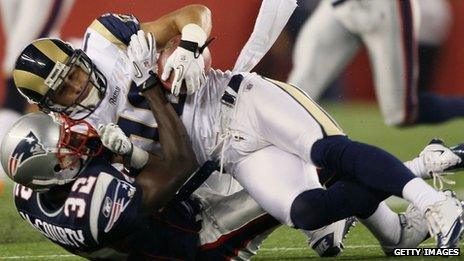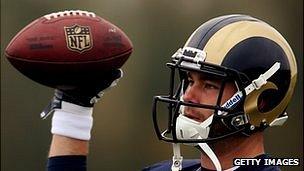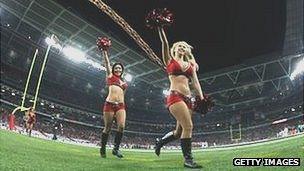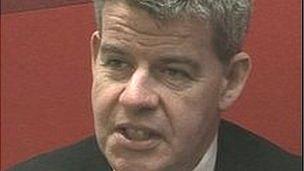NFL continues American football export drive to UK
- Published

The St Louis Rams will take on the New England Patriots in London
The star-spangled NFL caravan has entered town for another year, with a huge crowd at Wembley set to cheer on the New England Patriots and the St Louis Rams in the latest American football game to be staged in the UK.
The US's most popular sport is in the middle of a serious export drive, as it seeks to make continued inroads into a market usually seen as the home of that other form of football, soccer.
The National Football League (NFL) is one of the world's largest, and richest, sporting businesses, with annual revenues of more than $9bn (£5.5bn).
The importance it places on the UK market is reflected in the fact that Sunday's match is not a friendly, but a regular-season game, as all the NFL contests staged in London since 2007 have been.
'Planning for future'
Fixtures in London are set to continue until at least 2016, but why does the league continue to leave its own shores to play these International Series matches in the UK?
According to Alistair Kirkwood, managing director of NFL UK, there are two - related - reasons.
The first is that the league is so popular in the US that it might soon reach saturation point there, meaning the NFL has to find new markets to expand.

Earlier games at Wembley have proved popular with UK-based NFL fans
And the other is that the UK has a highly developed sporting landscape, where fans follow other sports as well as their main sporting interest, thus making it attractive to the NFL.
"The NFL is arguably stronger in the US than the Premier League is in England," says Mr Kirkwood, pointing to average 66,000 attendances at games in the US, and strong increases in TV viewing figures.
"They appreciate that if this continues then at some point in the future they will hit saturation point, and not be able to go any further. So the games in London are part of planning for the future, part of looking for new markets."
He continues: "The UK is a country where people have an interest in a broader range of sports than in probably any other country. You can have your major sport and then follow a lot of other ones too. You don't find this in France or Germany.
"So we are looking to be an 'additive' sport in the UK - you can be a Chelsea fan and also a New England Patriots fan too."
'Robust' model
In the US, the NFL is a success story - being the most-watched and richest sport - and one earning huge sums from packed stadiums, television deals, sponsorship and merchandising.

The NFL says it has a business model designed to deliver "sporting parity"
Television viewing figures have increased by 14% over each of the past two years, says Mr Kirkwood, and each year more than 160 million tune in for Super Bowl, the climax of the season.
But the NFL has not been without its troubles over the past year or so. First there was the 2011 player lock-out, imposed by the owners of the NFL's 32 teams, that lasted from March to July, when they and the players could not agree on a new collective bargaining agreement.
That row was eventually resolved, but in the past few months there was a dispute between the NFL and match officials, which led to a referee lock-out at the start of the 2012 season. That row lasted from June to September this year before agreement was reached.
And the NFL has also had to weather the global economic downturn, which hit the US.
"I think the NFL has been able to flourish because of the robustness of its league model," says Mr Kirkwood.
"It is a closed league with no relegation or promotion, and all league decisions need to be agreed by three-quarters of the 32 owners, which means people are all generally moving in the same direction.
"In addition, some 80% of revenues are pooled together and distributed evenly."
That means Green Bay, with a 100,000 population, can see its NFL team, the Packers, compete against teams from New York, where there is a 10 million population and a bigger sports market.
Mr Kirkwood also says the NFL salary cap, and player draft system - where the weakest teams get first pick of the best players, have created "a business model designed to deliver sporting parity".
Two games
Back in the UK, last week the NFL announced that the Minnesota Vikings would play the Pittsburgh Steelers at Wembley on Sunday, 29 September, 2013, a month before the Jacksonville Jaguars play the San Francisco 49ers there on Sunday, 27 October.
And as well as this double-game move, the Jacksonville Jaguars recently committed to playing a "home" game at Wembley Stadium every season, from 2013 to 2016.
This continued commitment to London, and the high-profile nature of the game, makes it attractive to commercial partners.

Mr Kirkwood is looking to build the UK fanbase for the NFL
The title sponsor of this Sunday's game is soft drinks giant Pepsi Max, and other sponsors include Virgin Atlantic, Barclaycard, Papa Johns, Thomson Sport, Budweiser, EMC2, and Aon.
US insurance firm Aon, which is also a sponsor of the 2013 London games, is perhaps best known in the UK as being the principal partner and global shirt sponsor of football team Manchester United.
Aon, which employs 6,000 people in the UK, will also be working with the NFL to promote the sport in the UK and is planning to host a series of American football clinics.
The firm's global chief marketing officer, Phil Clement, says being associated with the NFL and the Wembley game is an ideal way to "showcase our services to clients and prospects in this key [UK] market".
Meanwhile, the NFL says the decision to hold two games in London next year is in "response to outstanding and growing fan support of football in the United Kingdom".
"The past five or six years have been about making it work," says Mr Kirkwood.
"Over the next three years, if the two games a year proves successful and if we continue to build our UK fan base, then the NFL will be in a very interesting place."